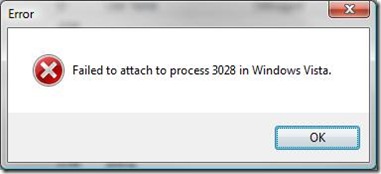Note to self about using the VMWare Visual Studio Integrated Virtual Debugger to attach to a service running on a VMWare Vista guest OS --
If you get the message similar to "Failed to attach to process" as below:
Don't forget to do the following in the Vista guest OS:
- Turn off firewall
- Add logged in user to Administrators group
- Disable User Account Control (UAC) by clicking "User Accounts" on the Control Panel, typing "user" in the search box and then clicking "Turn User Account Control (UAC) on or off".
Fool me once shame on you Vista, fool me twice shame on me -- I should have written this down the first time!

